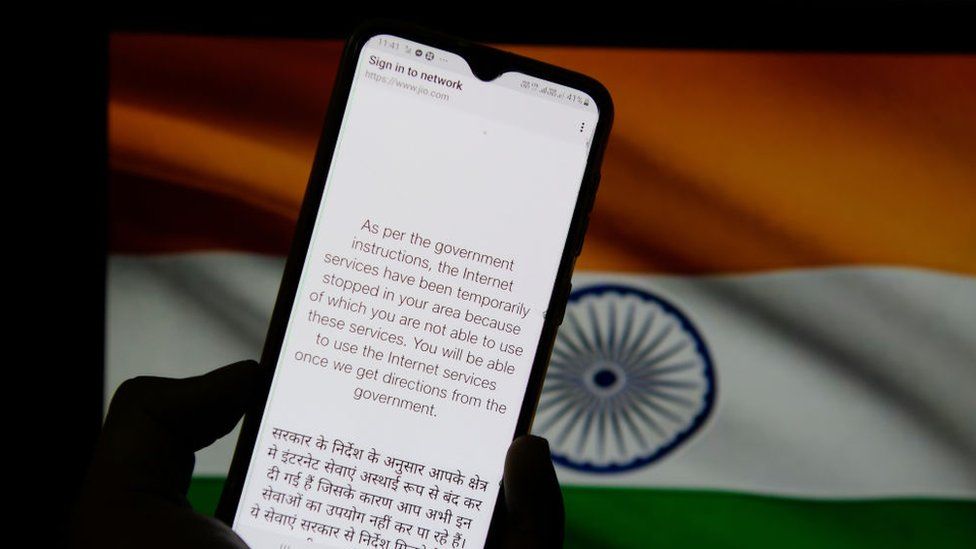Earlier this month, the Punjab government shut down mobile internet and SMS services for more than four days in order to apprehend a pro-Khalistani preacher. This is not an isolated incident in India, which has the world’s highest amount of internet shutdowns.

Internet outages around the globe
- India has the world’s highest amount of internet shutdowns.
- In most of Europe, North and South America, and Oceania, such shutdowns are never or almost never enacted, whereas they are common in Africa and Asia.
Instances of Internet Shutdowns by State
- Punjab has seen eight such shutdowns, according to the Software Freedom Law Center.
- Southern states, on the other hand, have only had six such shutdowns during the same time span, with no instance of internet shutdown in Kerala.
- The northern regions of Jammu and Kashmir, Rajasthan, and Uttar Pradesh have had the most internet outages in India.
In the absence of centralised data
- Absence of data: Despite the Standing Committee on Communications and Information Technology’s strong recommendation, the Central Government does not collect data on internet shutdowns enforced by state governments.
- Standing Committee on Communications and Information Technology: The Committee strongly opposed the use of internet shutdowns as a substitute for enforcing law and order and demanded that the reasons, duration, and decision of the competent authority and review committees be noted for each internet shutdown and made public.
Internet shutdowns are required.
- Civil unrest: The Internet is a medium for the transmission of information in the shape of images, videos, and text, which has the potential to create civil unrest and exacerbate law and order.
- Shutdowns to obstruct the flow of information about government actions or to halt communication among activists in order to prevent the spread of rumours and false news.
- Rumors: The shutdown serves to prevent the “spreading of rumours and misinformation through social media platforms, which can impede peace, law, and order.”
- Preventive reaction: Disabling Internet access is both an early and preventive reaction to preventing restive groups from organising riots against the government.
- National Interest: The Internet cannot exist in isolation from national authority. As a result, the necessary internet regulation is a reasonable option of sovereign countries based on national interests.
Costs of Internet Outages
- Education: Internet outages have an effect on education because students and instructors are unable to access online learning materials and tools. This can disrupt education and have a negative effect on academic achievement.
- For example, a UN report stated that long-standing connectivity restrictions in Kashmir have harmed the education of students who depend on remote education.
- Economy: During shutdowns, businesses that depend on the internet for operations may suffer significant financial losses. This is especially true for internet retailers, e-commerce platforms, and other providers of digital services.
- For example, a 2018 paper calculated that India lost around $3 billion due to shutdowns between 2012 and 2017.
- Health: The internet is essential for spreading health information and facilitating telemedicine. Shutdowns can make it difficult for individuals to obtain important health information or medical care.Communication: Internet outages severely limit people’s ability to communicate with one another, both within and outside of the affected area. This can make it difficult to organise protests or other forms of social and political action, as well as maintain contact with friends and family.
- Human rights are violated when the internet is shut down, including freedom of speech and access to information. They can also make it difficult for journalists and advocates to report on human rights violations.
- Shutdowns can be used in politics to suppress political opposition and avoid dissent. This is especially true during elections or periods of political unrest, when the government may attempt to restrict the spread of information that could be used against them.
@the end
Internet outages are becoming increasingly common in India, having a major impact on education, healthcare, and the economy. However, the government lacks a system for assessing the socioeconomic effect of internet outages. While enforcing law and order, it is also critical to consider the principle of proportionality and the socioeconomic effect of such shutdowns.
Source: https://indianexpress.com/article/explained/explained-the-frequency-reasons-and-controversy-over-internet-suspensions-by-the-government-8005450/
